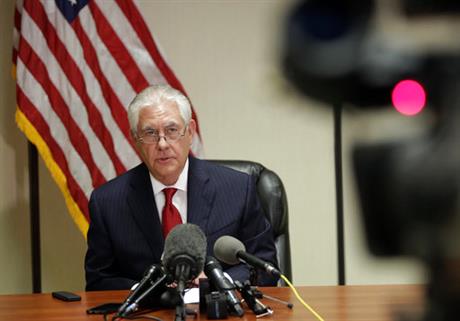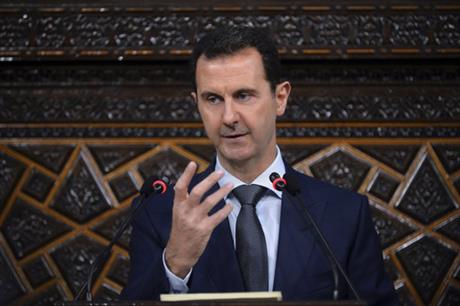PALM BEACH, Fla. (AP) — The Trump administration hinted at military action against Syria Thursday as the president and top officials considered how to retaliate against President Bashar Assad for this week’s chemical weapons attack that killed more than 80 people. Military leaders discussed options with the White House, likely including a missile strike.
President Donald Trump suggested that Assad may have to leave power, and his comments were strongly underscored by Secretary of State Rex Tillerson, who told reporters “there’s no role for him to govern the Syrian people.”
Among the options being considered was an immediate, overnight strike, according to two U.S. officials, who weren’t authorized to discuss military planning publicly and requested anonymity. Tillerson and other top national security figures were hastily called to a meeting to discuss military options, one of the officials said. At the Pentagon, meanwhile, members of the Joint Chiefs of Staff gathered for a meeting with the chairman, Gen. Joseph Dunford, in his office.

The administration has been put to the test this week amid an international outcry over the newly horrifying violence in Syria. Over the past seven years, hundreds of thousands of people have been killed in the nation’s civil war, triggering the worst refugee crisis since World War II.
Trump’s tone has grown graver with the passing days. On Wednesday, he said this week’s attack crossed “a lot of lines” — not just the “red line” of chemical weapons use that President Barack Obama once set as an ultimatum for the Assad government.
Trump has shown a particularly emotional response to photos and video of dead children, and he said Thursday, “I think what happened in Syria is a disgrace to humanity.” Asked if Assad should remain in power, he said that “he’s there and I guess he’s running things so something should happen.”
Trump commented aboard Air Force One on his way to meet China’s President Xi Jinping at a Florida summit, which will include talks about North Korea’s missile and nuclear programs.
The range of possible military options against Syria would be likely to mirror those shelved at the last minute by the Obama administration in 2013. Then, the U.S. was poised to launch missiles from ships in the Mediterranean, targeting military airfields, command and control facilities and other key locations.
A precise missile strike, potentially against targets associated with the chemical weapons attack, would be considered a limited response, especially in an area where there would be little possibility Russian troops would be present.
The U.S. doesn’t want to start a war with Moscow, and there are Russian troops, aircraft and other equipment on most of the Syrian bases.
Any action in Syria while Trump is meeting Xi in Florida could also serve as a message to China.
Washington is trying to persuade Beijing to adopt a tougher approach to its North Korean ally, much like the U.S. pressure campaign with the Russians on Syria. Strikes in Syria would show the Chinese that Trump isn’t afraid of unilateral military steps to advance American interests, even if key nations are standing in the way.
Tillerson, who spoke almost simultaneously after greeting Xi in Florida, said there was “no doubt in our minds” that Assad’s government was behind the attacks and the U.S. was evaluating an appropriate response.
“The process by which Assad would leave is something that will require an international community effort,” Tillerson said, adding that there needs to be a balance between defeating the Islamic State group and stabilizing Syria to prevent the civil war from escalating further.
Tillerson also issued a warning to Russia that its support of the Assad government is something that it should “consider carefully.”
Trump’s top diplomat has been in contact with his Russian counterparts, according to an administration official, who insisted on anonymity to discuss sensitive planning. Trump hasn’t spoken with Russian President Vladimir Putin, but told reporters traveling with him to Florida Thursday that he may do so.

In Moscow, Putin’s spokesman said Russia’s support for Assad has limits but there must be a full investigation of the attack before the United Nations takes any action.
As for Russia’s influence, Dmitry Peskov said in an interview with The Associated Press that “it is not correct to say that Moscow can convince Mr. Assad to do whatever is wanted in Moscow. This is totally wrong.”
In Washington, two senior Republican senators called for Trump to strike at Syria’s air force in response to the attack, which killed more than two-dozen children.
Sens. John McCain of Arizona, who spoke to Trump on Wednesday, and Lindsey Graham of South Carolina said in a statement that Assad “must pay a punitive cost for this horrific attack.”
“This is a test of the new administration, but also for our entire country,” said Graham and McCain, who have been among Trump’s harshest congressional critics. “Assad is trying to see what he can get away with.”
Graham later told reporters he doesn’t believe Trump needs Congress to authorize the use of military force in Syria. “Hit this guy,” Graham said of Assad.
Sen. Bob Corker of Tennessee, the Republican chairman of the Foreign Relations Committee, took a more measured approach, saying he first wanted to hear from the White House what military options it may be considering.
___
Associated Press writers Josh Lederman, Lolita C. Baldor and Richard Lardner contributed from Washington.